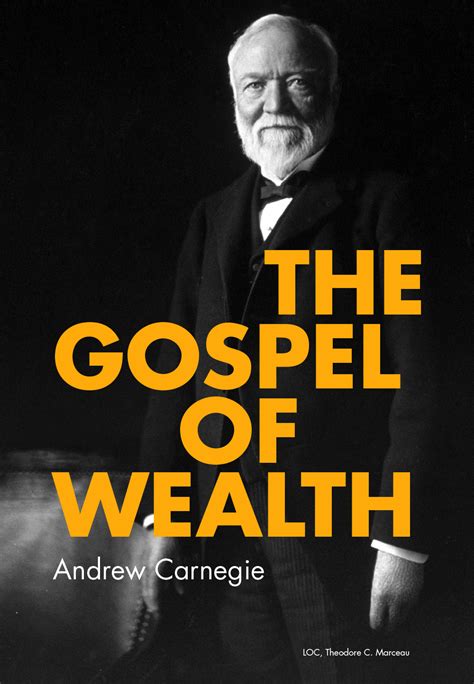Introduction:

The Gospel of Wealth is a concept that emerged in the late 19th century in the United States, promoting the idea that wealthy individuals have a moral obligation to use their fortunes to benefit society. This belief system played a significant role in shaping American economic and social policies during that era. Let’s delve into the definition and impact of the Gospel of Wealth on U.S. history.
Definition of the Gospel of Wealth
The Gospel of Wealth was coined by social reformer Andrew Carnegie in his 1889 essay “Wealth.” Carnegie argued that wealthy individuals should consider themselves as “trustees of the poor,” responsible for using their wealth to improve the lives of those less fortunate. He believed that wealth accumulation was a responsibility rather than a privilege, and that the wealthy had a moral duty to give back to society.
Key Principles of the Gospel of Wealth:
- Wealth accumulation is a result of divine favor and personal effort.
- The wealthy have a moral obligation to use their fortunes for the betterment of society.
- Philanthropy is a primary means of fulfilling this obligation.
- Social inequality is inevitable and can be justified by the unequal distribution of talent and ability.
Impact on U.S. History
The Gospel of Wealth had a profound impact on American society during the Gilded Age, a period of rapid economic growth and industrial expansion.
Philanthropic Efforts
Inspired by the Gospel of Wealth, wealthy individuals established numerous philanthropic endeavors, including foundations, libraries, museums, and universities. These institutions played a vital role in shaping American education, healthcare, and social welfare systems.
Social Reform Movements
The Gospel of Wealth also influenced social reform movements, such as the Progressive Era. Reformers sought to address issues of poverty, inequality, and corporate greed, using the principles of the Gospel of Wealth as a guide.
Government Policies
The Gospel of Wealth influenced government policies related to wealth distribution and taxation. Progressive reformers advocated for measures such as progressive income taxation and antitrust legislation, aimed at curbing the concentration of wealth in the hands of a few individuals.
Criticism and Counterarguments
The Gospel of Wealth has faced criticism over the years:
- Lack of Accountability: Critics argue that the Gospel of Wealth leaves wealthy individuals with too much discretion over how their fortunes are used, without sufficient accountability.
- Perpetuation of Inequality: Some scholars argue that the Gospel of Wealth perpetuated inequality by absolving the state of its responsibility to redistribute wealth and address systemic social problems.
- Distraction from Structural Issues: Critics suggest that the focus on individual philanthropy can distract from addressing the underlying causes of poverty and inequality within society.
Legacy and Modern Applications
Despite these criticisms, the Gospel of Wealth left a lasting legacy in American society. The philanthropic institutions established during this era continue to play a significant role in shaping various sectors of society.
Modern applications of the Gospel of Wealth principles include:
- Impact Investing: Investing in businesses and organizations that generate both social and financial returns.
- Social Entrepreneurship: Utilizing entrepreneurial skills to address social challenges and create positive change.
- Philanthropic Trusts: Establishing trusts that provide funding for specific charitable causes over time.
Tables and Statistics
Table 1: Philanthropic Donations by the Wealthiest Americans (2020)
| Individual | Donation Amount |
|---|---|
| MacKenzie Scott | $5.86 billion |
| Bill and Melinda Gates | $2.5 billion |
| Michael Bloomberg | $1.6 billion |
| Warren Buffett | $1.5 billion |
| Jeff Bezos | $1 billion |
Table 2: Growth of Philanthropic Funding in the United States (2010-2020)
| Year | Total Funding (in billions) |
|---|---|
| 2010 | $348.4 |
| 2015 | $427.7 |
| 2020 | $458.8 |
Table 3: Top Philanthropic Foundations in the United States (2021)
| Foundation | Assets (in billions) |
|---|---|
| Bill & Melinda Gates Foundation | $51.5 |
| Fidelity Charitable | $44.2 |
| Vanguard Charitable | $34.5 |
| Schwab Charitable | $27.2 |
| Charles Schwab Foundation | $12.1 |
Table 4: Impact of Philanthropy on American Society
| Sector | Philanthropic Funding |
|---|---|
| Education | 51% |
| Health and Medical Research | 17% |
| Social Services | 12% |
| Arts and Culture | 8% |
| Environment | 7% |
Conclusion:
The Gospel of Wealth played a significant role in shaping the economic and social landscape of the United States. While it led to the establishment of many important philanthropic institutions and influenced social reform movements, it also faced criticism for its potential to perpetuate inequality. Modern applications of the Gospel of Wealth principles, such as impact investing and social entrepreneurship, seek to address these concerns by promoting more equitable and sustainable wealth distribution. Understanding the Gospel of Wealth provides valuable insights into the history of American philanthropy and its influence on society today.
